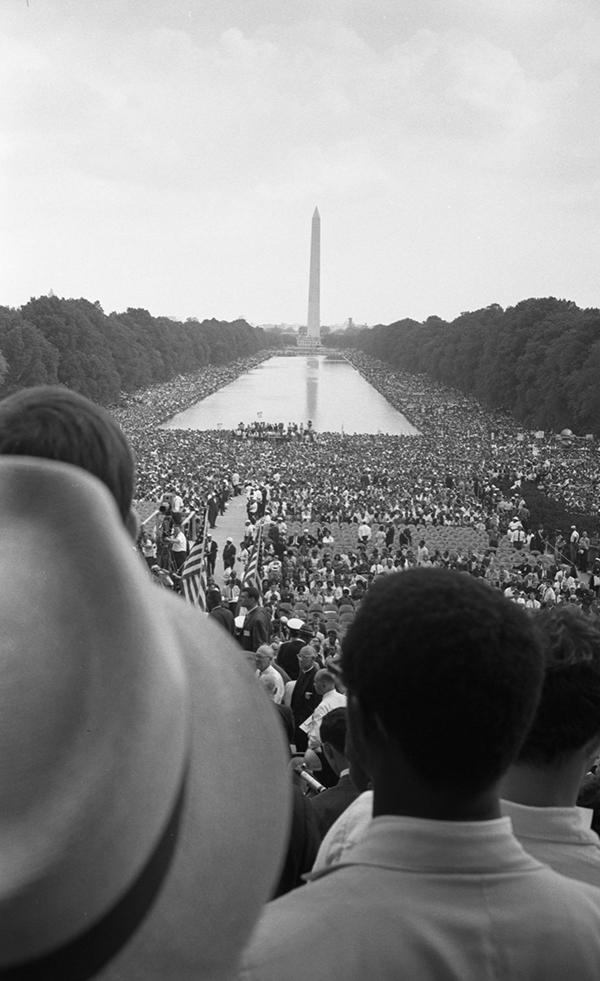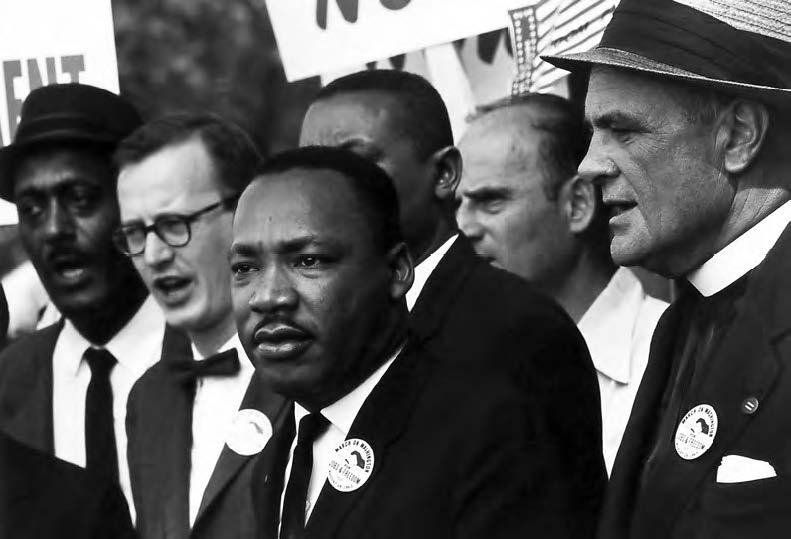
WASHINGTON — The March on Washington for Jobs and Freedom — a political demonstration that took place 60 years ago in the U.S. capital to protest racial discrimination and show support for major civil rights legislation pending in Congress — had a definite Catholic presence.
The Aug. 28 gathering of 250,000 people lining the Reflecting Pool at the Lincoln Memorial, is often remembered for the famous “I Have a Dream” speech of Rev. Martin Luther King, Jr., but there were several singers and speakers that day including Washington Archbishop Patrick O’Boyle, who gave the invocation at the beginning of the program.
The archbishop, a son of Irish immigrants, who was named a cardinal in 1967, was no stranger to civil rights. In 1949, a year after he was installed as Washington’s first archbishop and five years before the U.S. Supreme Court ordered desegregation of the nation’s public schools in Brown v. Board of Education, the archbishop ordered the desegregation of Catholic schools in the archdiocese.
In the early 1960s he promoted civil rights with a series of public statements and a speech in New York.
At the start of the March on Washington, he prayed for guidance for those gathered at the event but also for political leaders, judges, and the nation at large that God’s love would “replace the coldness that springs from prejudice and bitterness” and “open the eyes of all to the great truth that all men are equal.”
He also prayed for those who were “leaders in the struggle for justice and harmony among races,” that they would see “the ideals of freedom, blessed alike by our religious faith and our heritage of democracy” ultimately prevail.
In the work ahead for justice, he prayed that those at the forefront in this effort would be “sensitive to our duties toward others as we demand from them our rights. May we move forward without bitterness, even when confronted with prejudice and discrimination. May we shun violence, knowing that the meek shall inherit the earth.”
The Catholic Church leader also prayed that such meekness “be joined with courage and strength” so that with God’s help we shall “live together as brothers in dignity, justice, charity and peace.”
Archbishop O’Boyle almost didn’t say this prayer though. When he read a planned speech for the march by activist John Lewis, who later became a Congressman representing Georgia for more than 30 years, the archbishop found the message too inflammatory. He said if Lewis didn’t tone down the fiery rhetoric, he would not deliver his prayer.
One part in question was Lewis’ description of patience in the Civil Rights Movement as a “dirty and nasty word.”
“This is offensive to the Catholic Church,” Archbishop O’Boyle told Bayard Rustin, the march’s chief organizer, who in turn reminded Lewis that “Catholics believe in the word ‘patience.’ ”
Lewis, then 23 and chairman of the Student Nonviolent Coordinating Committee, agreed to change the line, which satisfied the archbishop, but his autobiography notes that several other leaders also had qualms with his speech and asked him to make it less incendiary.
Last-minute edits took place on a portable typewriter in a small office behind the Lincoln Memorial with leaders of the movement involved.

Something else that almost might not have happened was the sheer number of participants who attended the march, particularly since at that time only seven hotels in the District of Columbia accepted African Americans.
Read more: King’s ‘I Have a Dream’ Message Is Locked in a Local Woman’s Memory
A historical account of Catholic involvement in the march on the website of the Archdiocese of Washington, points out that the archdiocese provided overnight housing, dinner and breakfast for more than 2,000 march participants.
Hostels were set up at the gymnasiums at Georgetown University and at The Catholic University of America as well as schools and parish center buildings at four Catholic churches in the city.
In addition, the Knights of Columbus Supreme Board of Directors donated $25,000 to support temporary lodging for the march.
Several Catholic organizations also sponsored the march, including the National Catholic Conference of Interracial Justice, National Liturgical Conference, the Knights of Peter Claver, the National Catholic Social Action Conference, and the Alumni Guild of Catholic University and locally by the Catholic Interracial Council of Washington, the Third Order of St. Francis, Young Christian Workers, and the Knights of St John.
Parish groups from across the archdiocese and around the country participated on that historic day. St. Augustine’s, the oldest Black Catholic church in Washington, housed marchers, and its parishioners joined in the march on a special day for the parish, the feast of St. Augustine.
Another big thing that might not have happened at the march was Rev. King’s rhetorical flourish about his dream “when all God’s children, black men and white men, Jews and gentiles, Protestants and Catholics, will be able to join hands and sing in the words of the old Negro spiritual, ‘Free at last! Free at last! Thank God Almighty, we are free at last!’ ”
Accounts of the day note that his 16-minute speech was scheduled to be just four minutes long and the “I have a dream” part was not included in the written version.
Gospel singer Mahalia Jackson, who sang a spiritual before Rev. King’s remarks and stood behind the civil rights leader on the podium, called out during his speech: “Tell them about the dream, Martin, tell them about the dream!” referring to a theme he had spoken of in previous speeches.
Departing from his prepared notes, Rev. King then launched into the most famous part of his speech, telling the crowd that “even though we face the difficulties of today and tomorrow, I still have a dream.”
He spoke the words many can recite today, from his hope that one day his four children would “live in a nation where they will not be judged by the color of their skin but by the content of their character” to his belief that this nation will “rise up and live out the true meaning of its creed” that “all men are created equal.”
